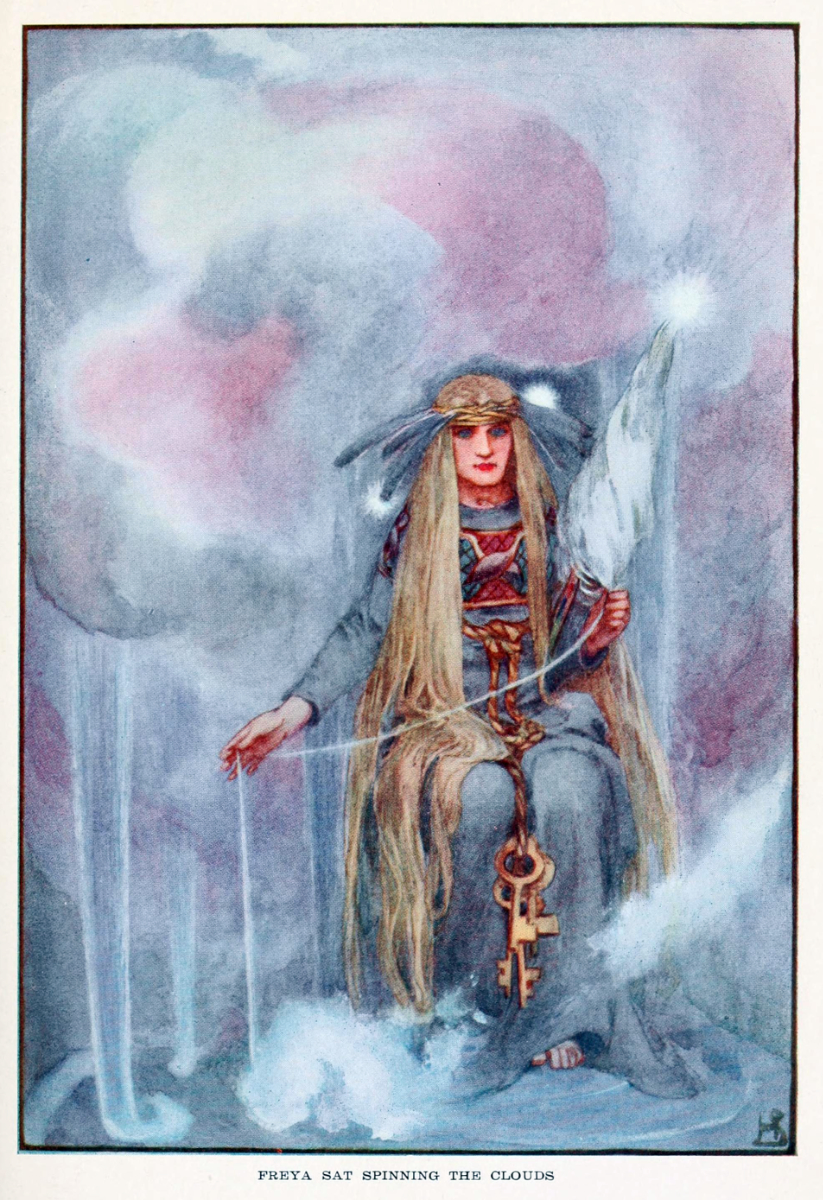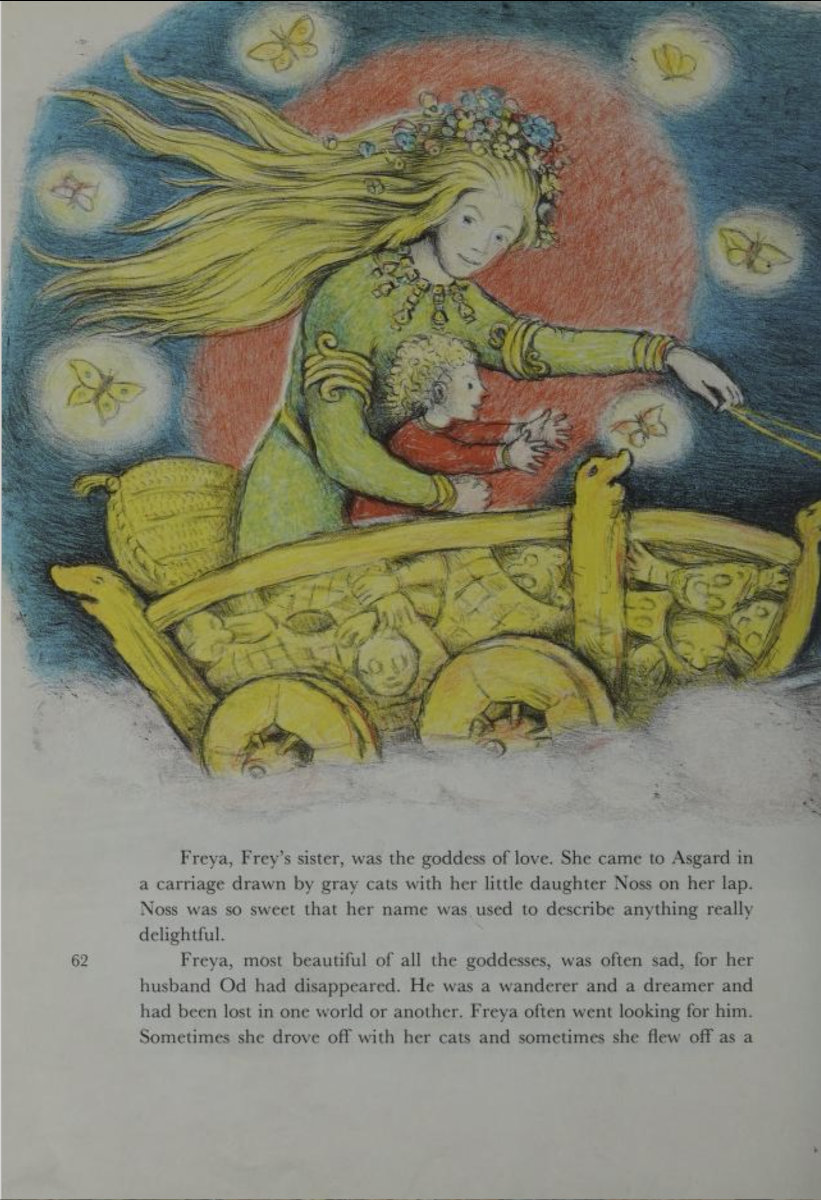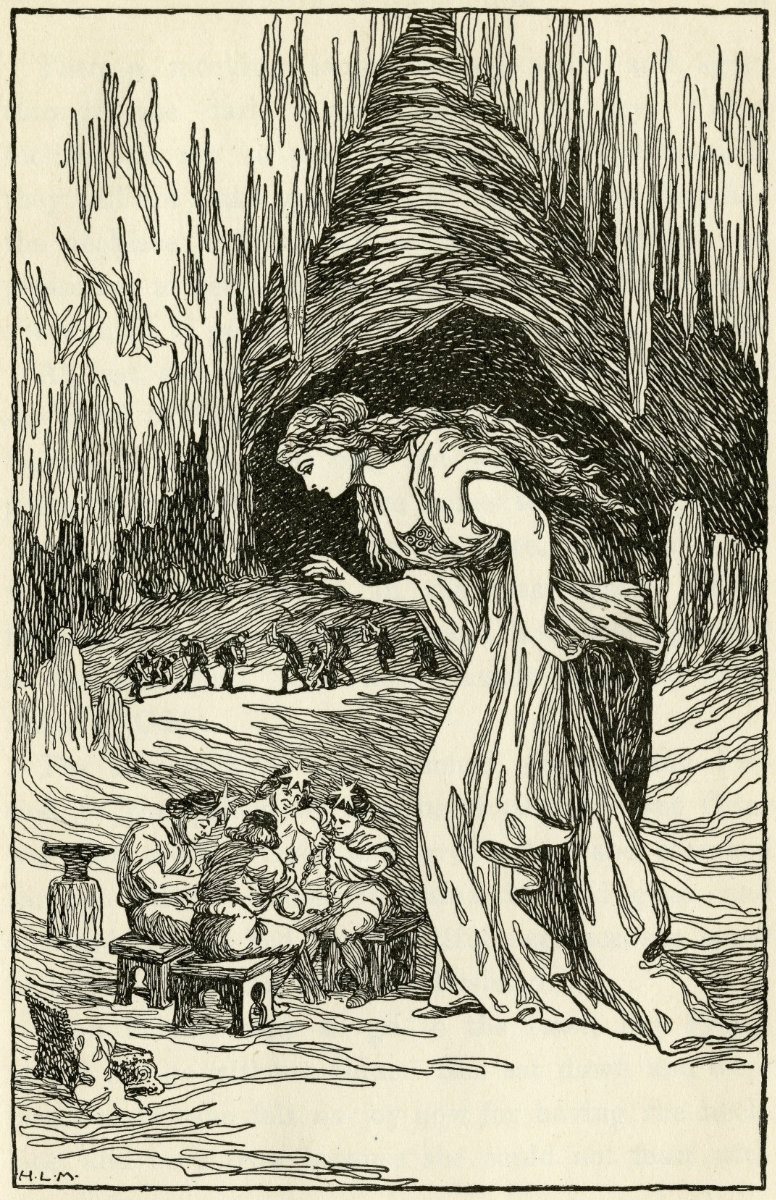In Norse mythology, Freyja is a goddess associated with love, beauty, fertility, sex, war, gold, and seiðr (magic for seeing and influencing the future). Freyja is the owner of the necklace Brísingamen, rides a chariot pulled by two cats, is accompanied by the boar Hildisvíni, and possesses a cloak of falcon feathers to allow her to shift into falcon hamr. By her husband Óðr, she is the mother of two daughters, Hnoss and Gersemi. Along with her twin brother Freyr, her father Njörðr, and her mother (Njörðr’s sister, unnamed in sources), she is a member of the Vanir. Stemming from Old Norse Freyja, modern forms of the name include Freya, Freyia, and Freja. Freyja rules over her heavenly field, Fólkvangr, where she receives half of those who die in battle. The other half go to the god Odin’s hall, Valhalla. Within Fólkvangr lies her hall, Sessrúmnir. Freyja assists other deities by allowing them to use her feathered cloak, is invoked in matters of fertility and love, and is frequently sought after by powerful jötnar who wish to make her their wife. Freyja’s husband, the god Óðr, is frequently absent. She cries tears of red gold for him, and searches for him under assumed names. Freyja has numerous names, including Gefn, Hörn, Mardöll, Sýr, Vanadís, and Valfreyja. Freyja is attested in the Poetic Edda, compiled in the 13th century from earlier traditional sources; in the Prose Edda and Heimskringla, composed by Snorri Sturluson in the 13th century; in several Sagas of Icelanders; in the short story “Sörla þáttr”; in the poetry of skalds; and into the modern age in Scandinavian folklore.
| Alias Freya |
| Real Names/Alt Names Gefn, Hörn, Mardöll, Sýr, Vanadís, Valfreyja |
| Characteristics Myths & Legends, Deity, Prehuman Epoch, Scandinavian |
| Creators/Key Contributors ○ |
| First Appearance Norse mythology |
| First Publisher ○ |
| Appearance List Literary: Prose Edda (c. 1220 CE), Poetic Edda (c. 1270 CE), The Heroes of Asgard: Tales from Scandinavian Mythology by Keary and Keary (1909), In the Days of Giants: A Book of Norse Tales by Abbie Farwell Brown (1902). Comics: Jumbo Comics #139, Treasure Chest of Fun & Facts #138, A Treasury of Horses |
| Sample Read A Book of Myths (1915) by Jeanie Lang [Internet Archive] |
| Description In Norse mythology, Freyja is a goddess associated with love, beauty, fertility, sex, war, gold, and seiðr (magic for seeing and influencing the future). Freyja is the owner of the necklace Brísingamen, rides a chariot pulled by two cats, is accompanied by the boar Hildisvíni, and possesses a cloak of falcon feathers to allow her to shift into falcon hamr. By her husband Óðr, she is the mother of two daughters, Hnoss and Gersemi. Along with her twin brother Freyr, her father Njörðr, and her mother (Njörðr’s sister, unnamed in sources), she is a member of the Vanir. Stemming from Old Norse Freyja, modern forms of the name include Freya, Freyia, and Freja. Freyja rules over her heavenly field, Fólkvangr, where she receives half of those who die in battle. The other half go to the god Odin’s hall, Valhalla. Within Fólkvangr lies her hall, Sessrúmnir. Freyja assists other deities by allowing them to use her feathered cloak, is invoked in matters of fertility and love, and is frequently sought after by powerful jötnar who wish to make her their wife. Freyja’s husband, the god Óðr, is frequently absent. She cries tears of red gold for him, and searches for him under assumed names. Freyja has numerous names, including Gefn, Hörn, Mardöll, Sýr, Vanadís, and Valfreyja. Freyja is attested in the Poetic Edda, compiled in the 13th century from earlier traditional sources; in the Prose Edda and Heimskringla, composed by Snorri Sturluson in the 13th century; in several Sagas of Icelanders; in the short story “Sörla þáttr”; in the poetry of skalds; and into the modern age in Scandinavian folklore. |
| Source Freyja – Wikipedia |





